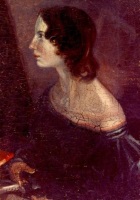Emily Jane Brontë Comments
she had a rough childhood I'm glad she got through it and didn`t give up with her sister
In Emily Jane Bronte's Intro-biography in Wuthering Heights she was born on the 18th of July 1818. Here the dates had been postponed to the 30th, is a misprint?
When I was youth, I loved Emily Jane Bronte so I wanted to marrage with her. I thought that to go bac to the past by time machine. Now I love her.
No other soul has echoed the feelings of my own heart so consistently as this lady.
I was wrong. the poem 'silent is the house' is on here, its just under the title 'the visionary'.
The following poem was written by Emily Brontë; (Born in Irland- 1818- and died at the age of thirty- 1848) . Most of her poetry reflected her life. A passionate woman thou silent, reserved and loner, therefore sad and sorrow. 'I am the only being whose doom' have six stanza; the rhyme and rythem follow a regular scheme; and the use of figures of speech give a particular tender to it. The persona in the poem describes her reflection towards the world. A young girl- eighteen years- who realize youth is more than hopes and dreams. It implies truth and pain. Taking into account the fifth stanza: ' First melted off the hope of youth, then fancy's rainbow fast withdrew; and then experience told me truth in mortal bosoms never grew.' Her life have had more downs than ups, as she continuously mentions unhappy adjetives, such us: (doom, gloom, sad, drear, hollow) . The reader can tell that the persona's lack of affection when it says: ' As lone as on my natal day.' A simile that gives life to the poem. She seems to prefere death than life- ' No tongue would ask, no eye would mourn.'- a strong metaphor to make clear her whole idea; not only death but loneliness. Finally, the last stanza emphasise on a corrupted world- hollow, servile, insencere- which makes us forget our human essence becoming selfisk people; as she is 'friendless'.

I understood.ok